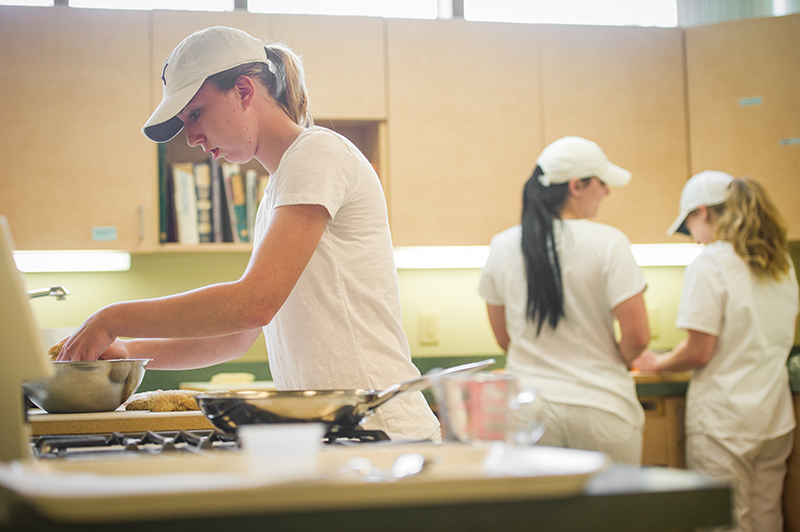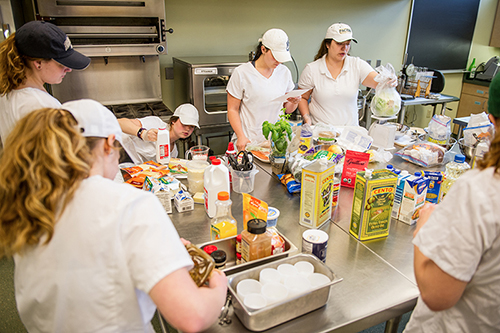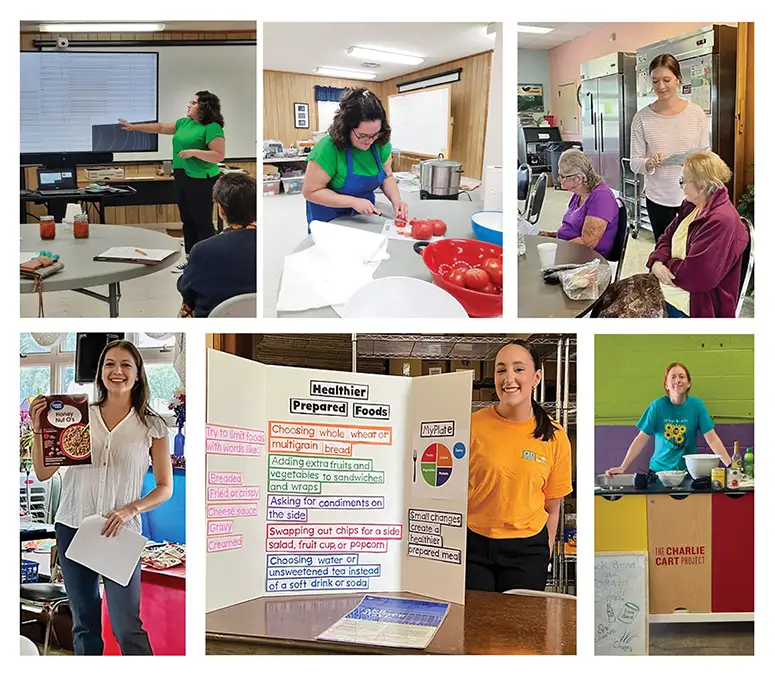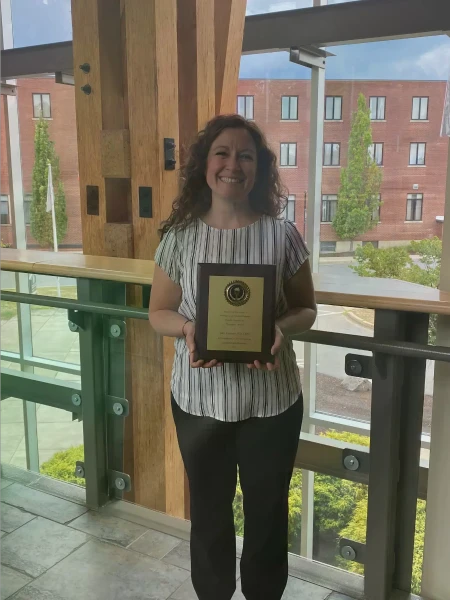Dietetic Experiential Track
**Now accepting rolling applications for 2025-2027 cohort until August 1, 2025

The program aims to confidently prepare students to enter professional practice as a well-rounded dietetics practitioner who strive to serve the public with evidence-based dietetic practice. The goals and objectives listed align with the University, Department, and Program’s Mission statements and will demonstrate that graduates of the program will successfully transition into the dietetics field.
Outcome data is available upon request.
Program Information
Onsite Track
Distance track
The Nutrition and Dietetics Mission
 The mission of the department of nutrition and dietetics is to provide dedicated faculty, quality facilities, and a diverse environment which support nationally recognized undergraduate and graduate education, research and service in the areas of nutrition, dietetics, family/consumer sciences, and sports nutrition/exercise science.
The mission of the department of nutrition and dietetics is to provide dedicated faculty, quality facilities, and a diverse environment which support nationally recognized undergraduate and graduate education, research and service in the areas of nutrition, dietetics, family/consumer sciences, and sports nutrition/exercise science.
The Nutrition and Dietetics programs offer several options allowing each student to choose the best path to achieving their professional goals. We use an individualized approach to providing a high quality, broad-based educational experience that empowers graduates to develop skills needed for future specializations. We offer a challenging but supportive and nurturing environment that facilitates both professional and personal growth.
The Nutrition and Dietetics programs have identified five goals to guide achievements and student learning outcomes:
- To foster a learning environment that leads to quality teaching and learning, original research contributions, and scholarly pursuits.
- To prepare students who can think critically in the theoretical and practical areas of nutrition, dietetics, and family/consumer sciences.
- To promote student commitment to lifelong learning, professional development, and community service.
- To encourage mentoring, teamwork, and collaboration.
- To empower students to excel in their knowledge and skill development in order to competitively enter the job market or other nutrition programs.
Hear From Our Students
-
 I did not expect this program to transform me as much as it has. It has given me such a high level of confidence going into the field of dietetics and really has prepared me to take on any opportunity that comes my way.
I did not expect this program to transform me as much as it has. It has given me such a high level of confidence going into the field of dietetics and really has prepared me to take on any opportunity that comes my way.Amber Mettin, Onsite 5-year program, '24
-
 I feel so much more prepared and ready after completing the program. After taking all these courses, I sometimes felt that I did not know much. Once I got into my rotations though, all the information I learned started to make sense as I saw it in real-life situations. Everything came together in the end and I am so thankful for Marywood, all the professors and preceptors I had along the way that got me to this point. I can officially say I feel ready and confident in entering the profession.
I feel so much more prepared and ready after completing the program. After taking all these courses, I sometimes felt that I did not know much. Once I got into my rotations though, all the information I learned started to make sense as I saw it in real-life situations. Everything came together in the end and I am so thankful for Marywood, all the professors and preceptors I had along the way that got me to this point. I can officially say I feel ready and confident in entering the profession.Erica Liu, Distance '24
-
 Completing Marywood University’s Master’s in Nutrition program was an enriching and transformative experience that exceeded my expectations in every way. The program not only provided me with a comprehensive understanding of nutrition principles but also equipped me with the practical skills and knowledge needed to excel in various professional settings. Through the rigorous coursework and hands-on experiences, I gained the expertise to design, conduct, interpret, and apply research effectively. The program’s emphasis on scholarship and leadership empowered me to advocate for evidence-based nutrition practices and influencepositive change in my community. Whether pursuing advanced professional opportunities or embarking on a career as a clinician, manager, educator, or researcher, Marywood’s Master’s in Nutrition program prepared me to thrive in any role I choose. With a solid foundation in nutrition science and a commitment to lifelong learning, I am confident in my ability to make meaningful contributions to the field and improve the health and well-being of individuals and populations alike. If you apply to the program, there are many resources provided to ensure your success as it did mine. Reach out to professors and other faculty when problems arise and they will work with you to stay on track, especially during the rotations. They are ready to help see you become an awesome RD and so am I.
Completing Marywood University’s Master’s in Nutrition program was an enriching and transformative experience that exceeded my expectations in every way. The program not only provided me with a comprehensive understanding of nutrition principles but also equipped me with the practical skills and knowledge needed to excel in various professional settings. Through the rigorous coursework and hands-on experiences, I gained the expertise to design, conduct, interpret, and apply research effectively. The program’s emphasis on scholarship and leadership empowered me to advocate for evidence-based nutrition practices and influencepositive change in my community. Whether pursuing advanced professional opportunities or embarking on a career as a clinician, manager, educator, or researcher, Marywood’s Master’s in Nutrition program prepared me to thrive in any role I choose. With a solid foundation in nutrition science and a commitment to lifelong learning, I am confident in my ability to make meaningful contributions to the field and improve the health and well-being of individuals and populations alike. If you apply to the program, there are many resources provided to ensure your success as it did mine. Reach out to professors and other faculty when problems arise and they will work with you to stay on track, especially during the rotations. They are ready to help see you become an awesome RD and so am I.Will Carter, Distance '24
-
 This program really opened my eyes to all of the various areas which RDs can work and make a difference. I feel more prepared since completing the program and that I used most, if not all, of the information I learned during my undergrad program. I am very happy with the program and how it has helped me improve!
This program really opened my eyes to all of the various areas which RDs can work and make a difference. I feel more prepared since completing the program and that I used most, if not all, of the information I learned during my undergrad program. I am very happy with the program and how it has helped me improve!Kelsey Banfield, Onsite 5-year program '24
-
 I feel like this program was very effective in preparing me for my first job! I have been working as a student clinical dietitian since the conclusion of the program and the transition was seamless! I am also going to be hired part-time as an RD-eligible employee. I also have an interview scheduled for a future full-time position post-exam completion!
I feel like this program was very effective in preparing me for my first job! I have been working as a student clinical dietitian since the conclusion of the program and the transition was seamless! I am also going to be hired part-time as an RD-eligible employee. I also have an interview scheduled for a future full-time position post-exam completion!Abigail Turner, 5-year program '24



